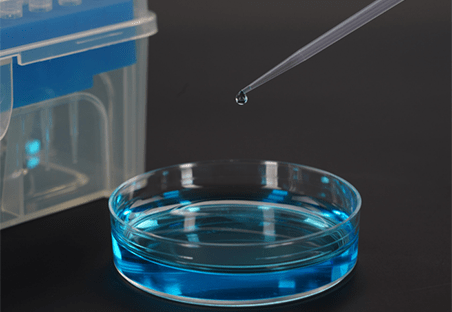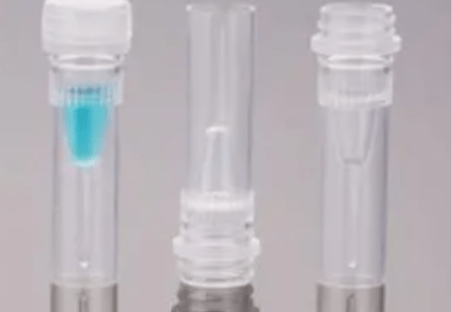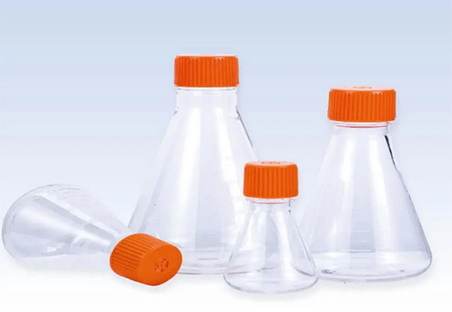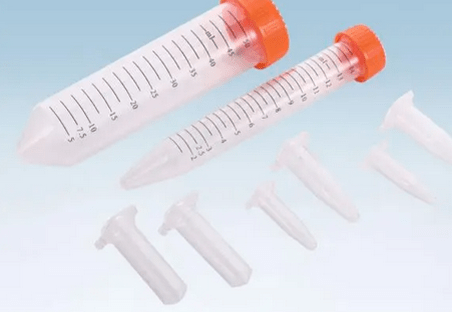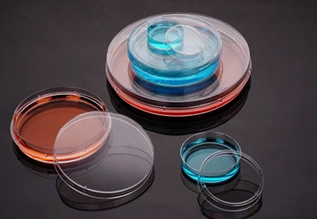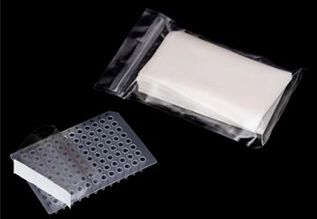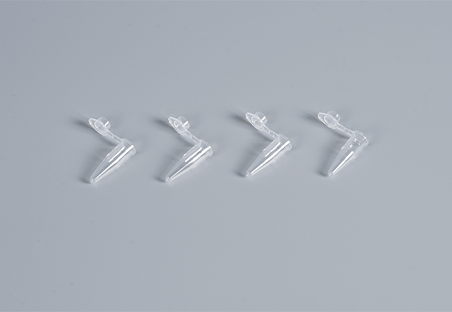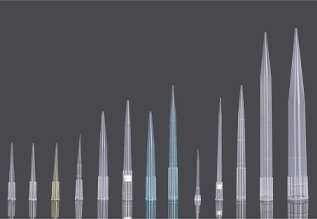Laboratory Erlenmeyer flasks, with their distinctive conical shape and wide base, are ubiquitous in scientific research. While the flask itself is a familiar sight, the choice of closure can significantly impact its performance and safety. In recent years, screw caps have emerged as the preferred closure for Erlenmeyer flasks, offering a host of advantages over traditional options like rubber stoppers or ground glass joints. This article will delve into the reasons why screw caps have become the go-to choice for laboratory Erlenmeyer flasks.
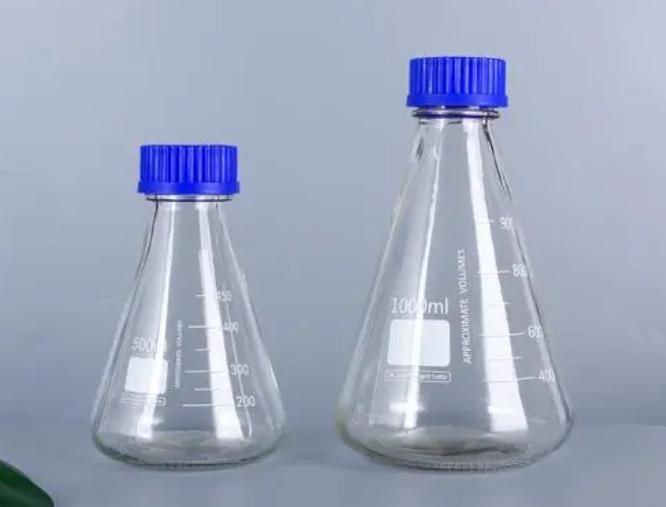
Advantages of Laboratory Erlenmeyer Flasks with Screw Caps
Laboratory Erlenmeyer flasks equipped with screw caps offer several distinct advantages over traditional designs, making them indispensable tools in modern scientific research. These advantages primarily stem from the superior sealing capabilities, enhanced safety features, and overall convenience provided by the screw cap design.
Superior Sealing Performance
- Tight Seal: Screw caps create a much tighter seal compared to other closure methods, such as rubber stoppers or ground glass joints. This ensures that the contents of the flask remain contained, preventing contamination and evaporation.
- Preservation of Samples: For experiments requiring long-term storage or volatile substances, the airtight seal provided by screw caps is crucial in maintaining sample integrity and preventing degradation.
- Prevention of Gas Leakage: In reactions involving gases, a secure seal is essential to prevent gas leakage, ensuring accurate measurements and preventing hazards.
Enhanced Safety
- Reduced Spill Risk: The tight seal significantly reduces the risk of spills, which can lead to accidents, contamination, and exposure to hazardous substances.
- Protection of Personnel: By minimizing the possibility of spills, screw caps contribute to a safer laboratory environment for researchers.
- Containment of Hazardous Materials: For experiments involving hazardous or corrosive substances, the secure seal provided by screw caps is essential for containment and preventing accidents.
Improved Convenience
- Easy to Use: Screw caps are simple to open and close, making them convenient for frequent use.
- Versatility: Screw caps are compatible with a wide range of flask sizes and shapes, offering versatility in experimental setups.
- Customization: Screw caps are available in various materials and with different liner options to accommodate specific experimental requirements.
In conclusion, laboratory Erlenmeyer flasks with screw caps offer a combination of superior sealing performance, enhanced safety, improved convenience, and durability, making them the preferred choice for a wide range of applications in scientific research. The tight seal, coupled with the versatility and durability of screw caps, contributes to more accurate, reliable, and safe experimental results.

Wide Applications of Laboratory Erlenmeyer Flasks with Screw Caps
Laboratory Erlenmeyer flasks with screw caps are versatile laboratory vessels designed to allow users to easily open and close the cap while maintaining a tight seal on the contents. These conical flasks find extensive applications in various fields, including but not limited to chemistry, biotechnology, pharmaceuticals, food, and cosmetics.
Chemistry and Pharmaceuticals
In chemistry experiments, Erlenmeyer flasks with screw caps are frequently used for storing chemical reagents and conducting chemical reactions. Their conical design helps prevent liquid splashing, and the smaller mouth reduces sample evaporation and contamination. Additionally, the screw cap ensures that the contents of the flask remain sealed during storage, protecting the laboratory environment.
In the pharmaceutical industry, these flasks are equally important. They can be used to store drug solutions, biological samples, blood samples, and other medical specimens. The screw cap design ensures that the flask maintains a good seal during use, preventing sample contamination and ensuring the accuracy of experimental results.
Food and Cosmetics
In the food and cosmetics industries, Erlenmeyer flasks with screw caps also have unique applications. They can be used to store food additives, fragrances, pigments, and other chemical components, ensuring that these components are not affected by the external environment during storage. Additionally, the cosmetics industry uses these flasks to store raw materials and finished products to maintain product stability and freshness.
Other Applications
Beyond the aforementioned fields, Erlenmeyer flasks with screw caps also play a significant role in environmental monitoring, agricultural research, and geological exploration. Their common characteristic is that they can provide a safe storage environment while being easy to operate and carry.

Precautions for Storing Laboratory Erlenmeyer Flasks with Screw Caps
Laboratory Erlenmeyer flasks with screw caps are commonly used in laboratories for storage and reactions. Proper storage is crucial for ensuring the accuracy of experimental results and the integrity of samples. Here are some specific precautions for storing laboratory Erlenmeyer flasks with screw caps:
- Material Selection and Matching
Laboratory Erlenmeyer flasks with screw caps are available in a variety of materials, such as polycarbonate (PC) and polypropylene (PP). Polypropylene is widely used due to its chemical resistance, heat resistance, and lightweight properties. When selecting a material, the appropriate material should be chosen based on the specific requirements of the experiment and the nature of the substance being stored. For example, if the experiment involves high temperatures or extreme pH environments, materials that are resistant to high temperatures or acids and bases should be selected.
- Temperature and Humidity Control
Laboratory Erlenmeyer flasks with screw caps should be stored in a dry, cool environment, avoiding direct sunlight and high temperatures. In particular, plastic flasks can deform or release harmful substances at high temperatures. At the same time, prevent mold growth caused by excessive humidity.
- Cleaning and Disinfection
Used flasks should be cleaned and disinfected thoroughly and promptly to ensure that there are no residues. For plastic flasks, it is not recommended to use hard brushes or other tools to avoid damaging the surface. It is recommended to use a mild detergent and cloth for cleaning.
- Avoiding Cross-Contamination
When using laboratory Erlenmeyer flasks with screw caps, cross-contamination should be avoided. Ensure that the flask is clean before each use, and if necessary, it can be sterilized at high temperature and high pressure. In addition, different samples should be distinguished by different markings to prevent confusion.
- Storage Method
When storing, the flask should be placed on a stable, flat surface to prevent tipping or falling. The screw cap should be tightened appropriately, neither too loose nor too tight, to prevent loosening due to vibration.
Special Considerations
- For samples that need to be stored for a long time, the condition of the flask should be checked regularly, and if necessary, replaced with a new one.
- If the sample is likely to generate pressure (such as gas accumulation), ensure that the flask has adequate ventilation or use a suitable explosion-proof design.
- For reusable flasks, strictly follow the manufacturer’s instructions for operation and maintenance to extend the service life.

The Indisputable Benefits of Screw Caps
The advantages offered by laboratory Erlenmeyer flasks with screw caps are undeniable. From their superior sealing performance to their enhanced safety features and improved convenience, screw caps have revolutionized the way scientists work. The versatility of these flasks, coupled with the reliability and ease of use provided by screw caps, make them an essential tool in laboratories across various fields. Lab consumables supplier Scopelab will provide you with quality laboratory Erlenmeyer flasks with screw caps, please contact us right now!
